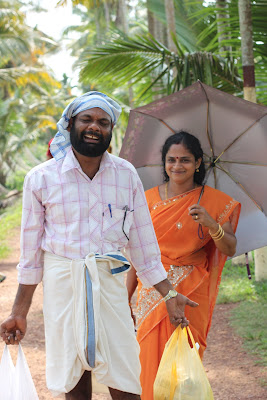
 Ken and I went CRAZY for this sauce -- Preserved lemon chili sauce called "Pickle Lemon" You can also get "Pickle Mango"
Ken and I went CRAZY for this sauce -- Preserved lemon chili sauce called "Pickle Lemon" You can also get "Pickle Mango"

 This Saint Chavara was born here in the 1800s and his birth home is inside this Catholic Church.
This Saint Chavara was born here in the 1800s and his birth home is inside this Catholic Church. This nun dedicates her life to the memory of the saint and his birthhome. She was SO excited to have westerners she could talk to, her tongue tripped over itself telling us the saint's story.
This nun dedicates her life to the memory of the saint and his birthhome. She was SO excited to have westerners she could talk to, her tongue tripped over itself telling us the saint's story.


 Characters we saw on our walk through the backwaters skinny paths snaking their way through the rice paddies.
Characters we saw on our walk through the backwaters skinny paths snaking their way through the rice paddies.
 This scale was a carefully protected, major focus in the rice auctioning process, along our walk.
This scale was a carefully protected, major focus in the rice auctioning process, along our walk. The buyer brings his own scale, because he doesn't trust anyone else's scale to be truthful in measuring out his purchase. Now he's pushing his scale back to his boat.
The buyer brings his own scale, because he doesn't trust anyone else's scale to be truthful in measuring out his purchase. Now he's pushing his scale back to his boat. Snake boat, for the serious annual dragon boat-type of races through the backwaters. There's serious competition, with training for months and many, many rowers in each boat.
Snake boat, for the serious annual dragon boat-type of races through the backwaters. There's serious competition, with training for months and many, many rowers in each boat.

April 4, 2011
Whenever we mentioned to Indians we were going to Kochin, they all said “You taking the backwaters tour?” It’s a must-do in Kochin, even though it was a long drive there. Once you’re on the boat, you realize why everyone loves it – there’s a cool breeze and shade on board, with great food and tea served to you while you’re force to sit still and relax, enjoying seeing all the little island villages dotting the backwaters, along with the birds.
The backwaters is a few large lakes connected to the sea with innumerable canals woven through, that only boat captains seem to know. And, the local backwaters villagers get everywhere by ferry, waiting at a ferry stop as if waiting for a bus. The boat is made out of wood and is wrapped with a cover made of coconut palm and bamboo. It is rewoven anew once a year. You can actually sleep on the boat too, there were a couple bedrooms and kitchen on our boat, but there are some boats with 5 or 6 bedrooms, it seemed.
It took us in and out of canals, with Abraham steering a bit. Mostly we just sat and played cards, and I read my first New Yorker article in months. Ahhhhh…Did I say what a relief it was to have grandies around? And, then we rode through a series of canals with tight turns where we seemed to float through villagers’ backyards, able to peer into their private lives. They sure do a lot of laundry of those gorgeous saris. They also didn’t seem as poor as I thought in such an isolated location. In fact, no one seemed mired in the poverty I’d heard so much about in India. We came to the most wealthy state, called Kerala, which is also communist run so people can actually own their own land and the wealth is more distributed, it seemed.
We stopped for a walk. We had floated past hundreds of rice paddy fields, and we found where they auction off some of the rice. The auctioner brings his own scale, rolling the heavy scale from a boat to the rice site. He weighs it and it’s bought then put in a bag, on someone’s head, and carried to a rice barge.
Our walk took us down a long path, in between rice paddies and more nice homes to a Catholic church hidden deep in the backwaters. It was actually the birthplace of a local turned saint. And, they held school there. They housed nuns there. And, one of my favorite nuns gave us a tour, and you could not stop her from talking, her tongue tripped over itself. She really needed to socialize more. Anyway, we saw his shack home built from local trees and coconut palms, and Harvey, the Jew, gave the Catholic Church a donation. In India. The whole thing made me laugh.
We returned to fried bananas and more tea on a boat ride back home, weaving our way through the canals as the light faded. Mary and Harvey played cards with the kids and Ken, and just plain looked relaxed.
Click HERE to see a cricket game played by kids in the backwaters. India had just won the cricket world cup the night we arrived. Ken stayed up to watch the end, drink champagne with the crowd at our hotel, and brought up the winning strike over and over, to bond with the tuk tuk drivers and man on the Indian street.
Click HERE to see the THWACKING that occurs relentlessly when Indian wash their clothes on the side of the river. I now love my laundry machine. Or else it could be the best way for me to prevent grandma arms.





























No comments:
Post a Comment